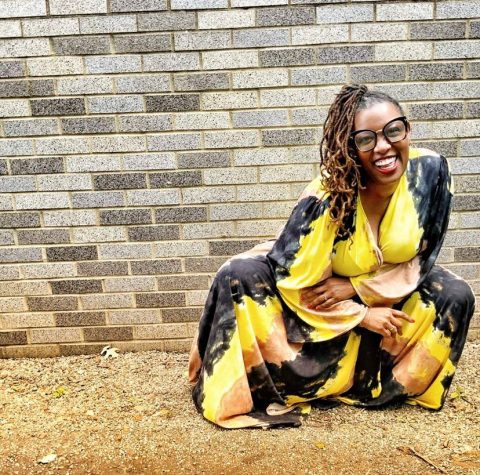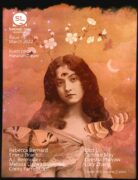While reading “Mayretta Kelly Brunson Williams Bryant Jones,” I laughed out loud several times (especially at the potato salad/crooked wig shade). The voice in this piece is very snarky Black auntie and I loved it. It read to me like May was the narrator for her own obituary. Is that true? If not, who is the narrator?
Yes! May wrote her own obituary. She was determined to have the last word about her life and her relationships.
An obituary seems the perfect framework for this piece as we learn so much about May’s strength, resilience, and joy through reading about her relationships with other people. What made you decide to structure the story in this way?
There’s a strange thing I do sometimes late at night when I’m procrastinating or stressed. I Google people I grew up with, people I went to school with, people from my old neighborhood. People from my past. I’m curious where they are now, what they’re doing and so on. And too often, what I end up discovering isn’t happy news. Too often, I end up finding their obituaries and learning that they died way too young, or violently, or both.
One particular night, I found the obituary for this guy (I’ll call him David) who was two or three years older than me. He lived on my street briefly when I was 9, maybe 10. The obituary didn’t list his cause of death so I searched until I found a news article that detailed his murder. This made me think about David’s mother and his sibling, and how devastating this must have been for them. I kept searching, and I found David’s mother’s obituary. I remembered that when we were neighbors, she was younger than I am now. Back in the day, I thought she was so cool and mysterious and sophisticated. She was such a bad-ass. Then I found David’s ex-wife’s obituary, and that combined with the news article filled in some blanks about who he had become in adulthood.
And I started thinking about what’s said in obituaries and what often goes unsaid. I thought about how obituaries and eulogies are incomplete (sometimes outright fictional) narratives, and how these narratives aren’t always blatant lies, but rather sins of omission. The point of view of the obituary narrative is third person; even if the deceased wrote or dictated their obituary prior to death, it’s always delivered in a voice other than their own. So I wondered what an older Black woman (someone younger than my grandmother, but older than my mother) might say if she wrote her own obituary and needed to set the record straight about a few things.
I love the conventions of the Black obituary form. It’s really a succinct accounting of birth, death, marital status, the ways we want others to see us and our families, the ways families and relationships configure, and the ways they shatter. I’m especially interested in the phenomenon of the “special friend” mentioned in obituaries. This is usually a long-time romantic companion that the deceased never married, and sometimes these folks were a same-gender couple. Respectability politics demand we present these relationships as platonic friendships in obituaries. So I wanted to explore those dynamics, in a humorous way.
While this story is humorous, it is also marked by an inescapable sense of grief and loss. There is so much life here (grandkids, stepkids, outside kids, grandnieces and nephews, the rich, drama-filled life May lived) and so much death (the obituary as a narrative vehicle, the terminally ill or murdered husbands, and at least seven usages of the word “deceased” after a person’s name was listed). Was this dichotomy intentional?
Yes. I experienced my mother’s impending death in this dichotomous way. She spent six weeks in hospice before she died, and she had such a wicked sense of humor on her deathbed. We laughed as much as we cried. Plus, celebration and laughter are embedded in Black folks’ death and mourning rituals. We tell funny stories, we dance and remember the good times.
I found it fascinating that May kept all of her last names, even from the husbands who wronged her. Why do you think she does this?
Another dichotomy. May dispenses with traditions and traditional expectations she doesn’t like, and upholds the rest. I also think she keeps those names because, despite things not working out, she regrets nothing. Some of us who are feminist interpret taking men’s last names as diminishing women, as an antiquated practice that erases us and relegates us to the status of property. But for May, her full name is a testimony of all she survived. She didn’t just marry these men; she survived them.
May curses, gossips, holds grudges, sleeps around, and even murders. Despite all of this, she was still “a lifelong and faithful member of New Mt. Hope Missionary Baptist Church.” She still viewed herself as God-fearing and religious. She seems to hold the church in such a begrudgingly reverent light that instead of punishing Rev. Earl directly for not keeping “his damn hands to himself” she punishes his brother. Can you speak to why this is?
Being “in the church” is one of those traditions that May embraces on her own terms. The “lifelong and faithful member” verbiage is boilerplate that can be found even in obituaries for Black people who haven’t stepped inside a church in decades. In May’s case, it simply means she regularly attended church. She doesn’t hold the church or Rev. Earl in a reverent light. Further, I think she has a low opinion of men in general, and she certainly knows that pastors can be scoundrels too. Each time she married, she thought the man was worthy of her, that he would be different, better. Rev. Earl didn’t vow to love, honor, cherish, and protect her; his brother did, and he failed to keep his word. So May’s beef is with the man who broke his vows to her.



 The core workshop of SmokeLong Fitness is all in writing, so you can take part from anywhere at anytime. We are excited about creating a supportive, consistent and structured environment for flash writers to work on their craft in a community. We are thrilled and proud to say that our workshop participants have won, placed, or been listed in every major flash competition. Community works.
The core workshop of SmokeLong Fitness is all in writing, so you can take part from anywhere at anytime. We are excited about creating a supportive, consistent and structured environment for flash writers to work on their craft in a community. We are thrilled and proud to say that our workshop participants have won, placed, or been listed in every major flash competition. Community works.